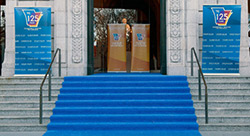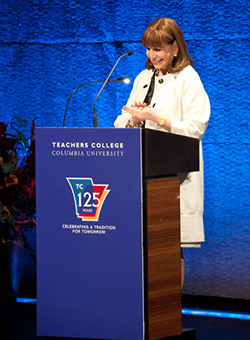Here's to History Repeating Itself
Old artifacts and past glories were only half the story this past Monday evening at an opening night bash to launch "Teachers College: Pioneering Education through Innovation," a month-long exhibit at the New York Historical Society.
On opening night at the New York Historical Society, hopes for a future even brighter than TC’s past
Old artifacts and past glories were only half the story this past Monday evening at an opening night bash to launch “Teachers College: Pioneering Education through Innovation,” a month-long exhibit at the New York Historical Society. The bolded line in the first paragraph just below should hotlink to the what is currently the main story on the TC home page.
Guests were treated to an exhibit that not only tells the story of TC’s remarkable “legacy of firsts”– the many fields created at West 120th Street, from nursing education in 1898 to spirituality in psychology in 2012 – but also highlights current work at the College that promises, once again, to reshape the world.
In the evening’s keynote address, Kenneth T. Jackson, Columbia University’s Jacques Barzun Profess or of History and Director of the Herbert H. Lehman Center for American History, spoke about the Gilded Age in New York City as the birth-period of modern-day American philanthropy, when a group of leading families created a remarkable assortment of institutions that continue to drive the civic and cultural life of New York City.
The evening’s piece de resistance was a shout-out to current-day members of five of the families that founded many of those institutions – the Vanderbilts, the Macys, the Milbanks, the Rockefellers and the Dodges – who ascended the stage of the Historical Society’s theater, accompanied by members of the Teachers College Student Senate, to be acknowledged for their families’ ongoing good works.
Published Thursday, Mar. 7, 2013





